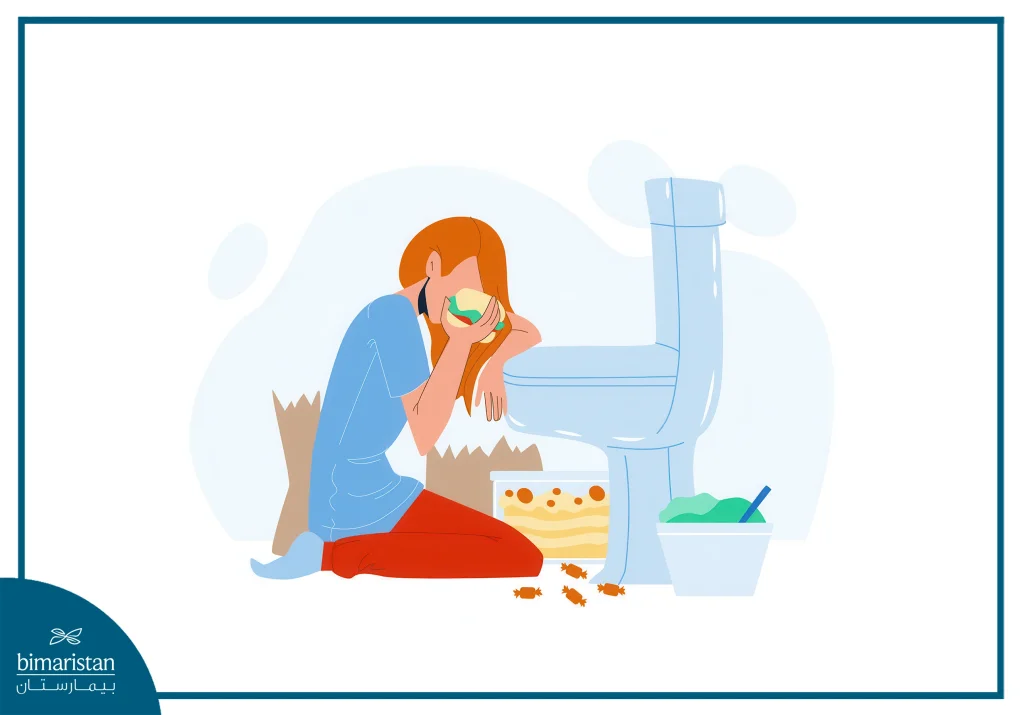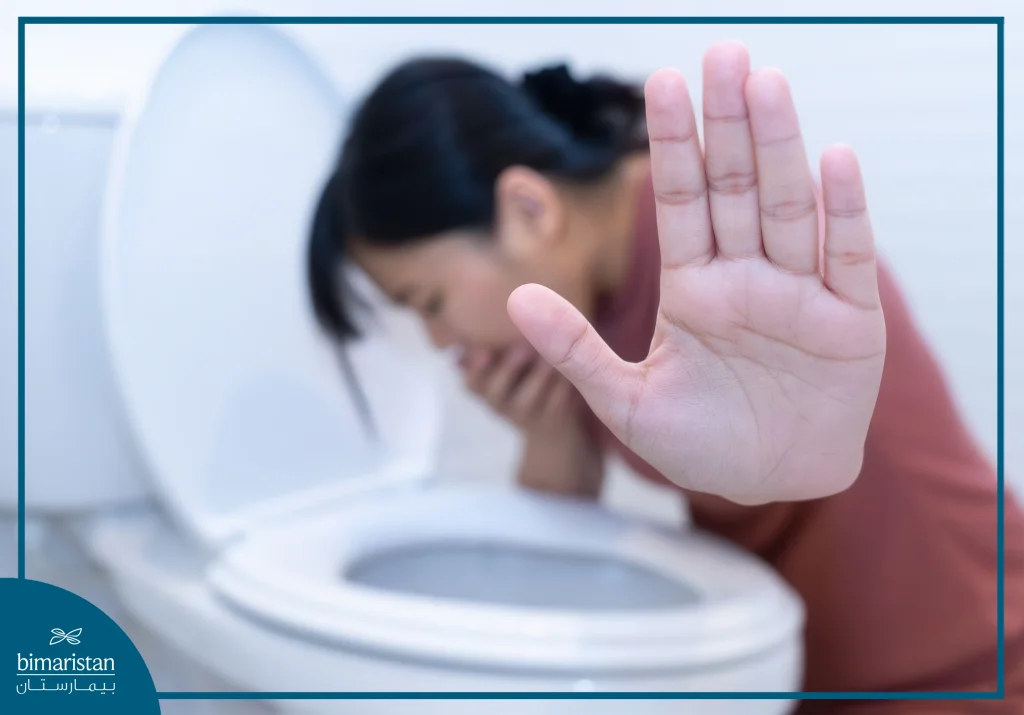Eating disorders are one of the psychological health issues that have increased interest in modern societies, and one of the most prominent of these disorders is bulimia nervosa, as this disorder is characterized by complexity and is associated with multiple psychological, social, and biological factors.
This disease affects women at a higher rate than men, as 1-2% of women in the world are affected by this disease, while 0.5-1% of men are affected, which requires society to have a deep understanding of the nature of this disease and its psychological and physical effects.
What is bulimia nervosa?
Bulimia Nervosa is known as a serious and potentially life-threatening eating disorder, as people with this disease tend to overeat and feel like they have lost control of their eating habits.
The patient eats large amounts of food in one meal, often in secret, followed by intense guilt, after which the patient may engage in purging behavior, in which the patient eliminates excess food and calories in unhealthy ways, by forcing himself to vomit or taking laxatives (drugs that speed up the movement of food in the body), the patient may use diuretics or slimming pills, and exercise excessively.
Binge and purge cycles can occur several times a week or several times a day, in which case the condition can become life-threatening. People with bulimia are often of normal or above normal weight, which helps the patient hide the issue for years, and these behaviors are ingrained and difficult to change.

Bulimia symptoms
The symptoms of bulimia nervosa vary greatly, as there are often physical symptoms and serious psychological symptoms, which can seriously affect the patient’s health, several warning signs that indicate that a person has this disease, such as frequent trips to the bathroom after eating and wearing loose clothes to hide the body, in addition to the excessive use of mouthwash and gum, and several other symptoms appear:
- Weight fluctuations
- General fatigue, dizziness, and fainting
- Sleep problems
- Signs of self-induced vomiting (sores on the knuckles)
- Dry skin and brittle nails
- Menstrual irregularities
- Muscle weakness
- Redness of the eyes
Psychological symptoms of bulimia nervosa
The patient often feels guilty and anxious after eating, fearing for their health and weight. The patient becomes excessively preoccupied with weight, shape, and appearance, which leads to restrictive behaviors and extreme dieting to lose weight. Most people with eating disorders share certain psychological symptoms, such as:
- Low self-esteem
- Extreme fear of obesity
- feeling of helplessness
- Anxiety or depressive disorders
- Feeling disgusted after eating
- Self-assessment based on shape and weight
- Tendency to abuse drugs and alcohol
Physical symptoms
Bulimia Nervosa often causes gastrointestinal issues and dental damage as a result of self-induced vomiting and unhealthy eating habits:
- Constipation and reflux
- Puff
- Enlarged salivary glands
- Persistent soreness and pain in the throat
- Swollen cheeks or jaw
- stomach cramps
- Harbor erosion
- Tooth decay
- Gingivitis and bleeding

Bulimia nervosa causes
There is no exact cause of bulimia, but genetic and psychological factors may play a role in the development of bulimia nervosa and other eating disorders, in addition to social pressures, popular culture and the media may put pressure on people to have a certain body type, and these external factors can affect self-esteem, and feeling stressed, upset or out of control may lead to bulimia.
There is also some research that studies unusual brain activity, such as changes in the level of serotonin or other chemicals, to see how this might affect eating.
Factors that increase the risk of bulimia
Although there are no exact causes of bulimia, there are some risk factors that increase the incidence of the disease, including genetic, psychological, and social factors:
- Family history and genetics: The incidence of this disease increases when there are relatives who have been diagnosed with bulimia nervosa, suggesting a possible genetic link.
- Mental health and emotional issues: The disease is associated with mental and emotional health issues, such as anxiety, depression, and substance abuse, and patients may feel bad about themselves, especially if they are bullied because of their weight or body shape.
- Dieting: People who are dieting are more likely to develop bulimia, as their excessive fear of eating too many calories leads them to repeat bingeing and purging loops.
In addition, females are more likely to be affected than males, and bulimia nervosa often begins in late adolescence or early adulthood.
How is bulimia nervosa diagnosed?
The doctor performs a physical examination, asks the patient about their medical history and symptoms, may ask for details of the patient’s behavior, may request permission to obtain information from your relatives, and may perform blood and urine tests as well as kidney function tests and an electrocardiogram (EKG).
Your doctor will diagnose bulimia nervosa if the following criteria are met:
- Frequent episodes of binge eating in the patient
- Loss of control over eating in these episodes
- Performing inappropriate cleansing behaviors (vomiting or using laxatives)
- An eating episode occurs at least once a week for three months
- The patient’s self-esteem is significantly affected by their weight or body shape
Treatment methods for bulimia
The treatment of bulimia requires working with a multidisciplinary medical team in physical and mental health, including a general practitioner, psychiatrist, and nutritionist. Due to the seriousness of the condition, it is necessary to seek medical help as soon as possible, as early intervention greatly improves the results of treatment.
There are several types of treatment for bulimia, including psychotherapy, which includes:
- Family therapy (FBT): It helps parents deal with their child’s unhealthy eating behaviors.
- Dialectical Behavior Therapy (DBT): Helps patients regulate emotions, deal with stress, and improve relationships with others.
- Cognitive Behavioral Therapy (CBT)
Cognitive behavioral therapy (CBT) in the treatment of bulimia
Cognitive behavioral therapy (CBT) is one of the most effective treatment methods for bulimia nervosa, as it helps reduce eating episodes and associated purging episodes, improves body self-image by helping the patient identify unhealthy thought patterns and behaviors, and teaches the patient new strategies to deal with psychological stress without resorting to eating.
CBT works on several fronts, including regulating food intake, monitoring eating behavior, and modifying negative thoughts related to weight and shape.
Nutritional education
Nutrition education is also a great solution for treating uremia. A nutritionist helps develop a balanced dietary plan, aiming to minimize hunger or cravings. Regularity in eating and not depriving yourself of certain types of food are essential to overcoming the disease.
In addition to the above, there is drug therapy such as antidepressants and appetite suppressant medications, with fluoxetine (an antidepressant) being the approved medication for the treatment of bulimia in adults only.
The role of appetite suppressants in the treatment of bulimia nervosa
Although cognitive behavioral therapy is the best treatment for bulimia patients, there are some appetite suppressant medications that have proven effective in reducing eating episodes, often involving substances that affect neurotransmitters such as noradrenaline and dopamine, such as lismatamfetamine desmiselate, an appetite suppressant medication that has shown good initial results in reducing eating episodes.
However, the use of these drugs is still under study and experimentation, and has not been officially adopted as a mainstream treatment, due to concerns about side effects and misuse.

How to support a person with bulimia: Tips for family and friends
Parents may blame themselves for their child’s bulimia nervosa, but it is important for parents to know that this disorder has many causes and that parents are not the cause of the disorder, but rather parents and relatives play a big role in helping patients recover, here are some tips for parents and friends to help patients overcome the disease:
- Making sure the patient gets the right treatment
- Listen carefully to the patient and share your feelings without judgment
- Scheduling regular family meals
- Telling the patient about concerns about the disease without assigning blame
Managing the recurring symptoms of bulimia
This requires a combination of psychological and behavioral plans with social and medical support. The patient must identify the triggers that lead to an eating episode and record the times they occur, and must practice mindful eating, i.e. without distractions such as TV and phone, in addition to learning emotion management skills.
A relapse prevention plan must also be in place, including:
- Continue treatment
- Develop a contingency plan for relapse
- Avoid triggers
- Self-compassion instead of self-flagellation
- Engage in positive activities
In conclusion, bulimia nervosa is a complex psychiatric disorder in which behavioral, psychological, genetic, and social factors are intertwined, requiring a deep understanding and comprehensive approach to diagnosis and treatment, and the integration of psychological, behavioral, and nutritional therapy is a key pillar for achieving sustainable recovery.
Sources:
- J., Duarte, T. A., & Schmidt, U. (2020). Eating disorders. In StatPearls.StatPearls Publishing
- National Health Service (NHS). (n.d.). Bulimia nervosa. NHS. Retrieved May 14, 2025
- National Eating Disorders Association. (n.d.). Bulimia nervosa
